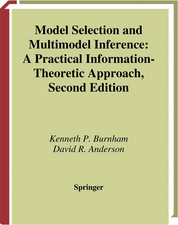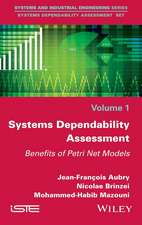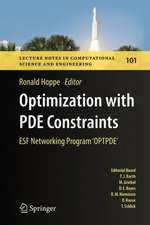Model-Based Decision Support Methodology with Environmental Applications: Mathematical Modelling: Theory and Applications, cartea 9
Editat de Andrzej P. Wierzbicki, Marek Makowski, Jaap Wesselsen Limba Engleză Paperback – 15 dec 2010
Therefore, there is a need to present the state of art of methodology and tools for development of model-based decision support systems, and illustrate this state by applications to various complex real-world decision problems.
The monograph reports many years of experience of many researchers, who have not only contributed to the developments in operations research but also succeeded to integrate knowledge and craft of various disciplines into several modern decision support systems which have been applied to actual complex decision-making processes in various fields of policy making. The experience presented in this book will be of value to researchers and practitioners in various fields. The issues discussed in this book gain in importance with the development of the new era of the information society, where information, knowledge, and ways of processing them become a decisive part of human activities. The examples presented in this book illustrate how how various methods and tools of model-based decision support can actually be used for helping modern decision makers that facecomplex problems.
Overview of the contents: The first part of this three-part book presents the methodological background and characteristics of modern decision-making environment, and the value of model-based decision support thus addressing current challenges of decision support. It also provides the methodology of building and analyzing mathematical models that represent underlying physical and economic processes, and that are useful for modern decision makers at various stages of decision making. These methods support not only the analysis of Pareto-efficient solutions that correspond best to decision maker preferences but also allow the use of other modeling concepts like soft constraints, soft simulation, or inverse simulation.
The second part describes various types of tools that are used for the development of decision support systems. These include tools for modeling, simulation, optimization, tools supporting choice and user interfaces. The described tools are both standard, commercially available, and nonstandard, public domain or shareware software, which are robust enough to be used also for complex applications.
All four environmental applications (regional water quality management, land use planning, cost-effective policies aimed at improving the European air quality, energy planning with environmental implications) presented in the third part of the book rely on many years of cooperation between the authors of the book with several IIASA's projects, and with many researchers from the wide IIASA network of collaborating institutions. All these applications are characterized by an intensive use of model-based decision support.
Finally, the appendix contains a short description of some of the tools described in the book that are available from IIASA, free of charge, for research and educational purposes.
The experiences reported in this book indicate that the development of DSSs for strategic environmental decision making should be a joint effort involving experts in the subject area, modelers, and decision support experts. For the other experiences discussed in this book, the authors stress the importance of good data bases, and good libraries of tools. One of the most important requirements is a modular structure of a DSS that enhances the reusability of system modules. In such modular structures, user interfaces play an important role.
The book shows how modern achievements in mathematical programming and computer sciences may be exploited for supporting decision making, especially about strategic environmental problems. It presents the methodological background of various methods for model-based decision support and reviews methods and tools for model development and analysis. The methods and tools are amply illustrated with extensive applications.
Audience: This book will be of interest to researchers and practitioners in the fields of model development and analysis, model-based decision analysis and support, (particularly in the environment, economics, agriculture, engineering, and negotiations areas) and mathematical programming. For understanding of some parts of the text a background in mathematics and operational research is required but several chapters of the book will be of value also for readers without such a background.
The monograph is also suitable for use as a text book for courses on advanced (Master and Ph.D.) levels for programs on Operations Research, decision analysis, decision support and various environmental studies (depending on the program different parts of the book may be emphasized).
| Toate formatele și edițiile | Preț | Express |
|---|---|---|
| Paperback (1) | 953.82 lei 6-8 săpt. | |
| SPRINGER NETHERLANDS – 15 dec 2010 | 953.82 lei 6-8 săpt. | |
| Hardback (1) | 961.10 lei 6-8 săpt. | |
| SPRINGER NETHERLANDS – 31 mai 2000 | 961.10 lei 6-8 săpt. |
Din seria Mathematical Modelling: Theory and Applications
- 18%
 Preț: 1115.28 lei
Preț: 1115.28 lei - 18%
 Preț: 724.63 lei
Preț: 724.63 lei - 15%
 Preț: 636.30 lei
Preț: 636.30 lei - 20%
 Preț: 333.04 lei
Preț: 333.04 lei - 20%
 Preț: 644.48 lei
Preț: 644.48 lei - 15%
 Preț: 642.98 lei
Preț: 642.98 lei - 15%
 Preț: 650.04 lei
Preț: 650.04 lei - 15%
 Preț: 643.34 lei
Preț: 643.34 lei -
 Preț: 396.40 lei
Preț: 396.40 lei -
 Preț: 391.79 lei
Preț: 391.79 lei -
 Preț: 400.85 lei
Preț: 400.85 lei - 18%
 Preț: 1232.57 lei
Preț: 1232.57 lei - 20%
 Preț: 354.17 lei
Preț: 354.17 lei -
 Preț: 397.76 lei
Preț: 397.76 lei - 15%
 Preț: 643.48 lei
Preț: 643.48 lei - 18%
 Preț: 897.65 lei
Preț: 897.65 lei -
 Preț: 409.30 lei
Preț: 409.30 lei - 15%
 Preț: 650.69 lei
Preț: 650.69 lei - 15%
 Preț: 650.86 lei
Preț: 650.86 lei - 15%
 Preț: 641.71 lei
Preț: 641.71 lei - 15%
 Preț: 644.63 lei
Preț: 644.63 lei -
 Preț: 394.71 lei
Preț: 394.71 lei - 15%
 Preț: 678.49 lei
Preț: 678.49 lei -
 Preț: 396.24 lei
Preț: 396.24 lei
Preț: 953.82 lei
Preț vechi: 1163.20 lei
-18% Nou
Puncte Express: 1431
Preț estimativ în valută:
182.51€ • 191.07$ • 151.02£
182.51€ • 191.07$ • 151.02£
Carte tipărită la comandă
Livrare economică 05-19 aprilie
Preluare comenzi: 021 569.72.76
Specificații
ISBN-13: 9789048154647
ISBN-10: 9048154642
Pagini: 492
Ilustrații: XV, 475 p.
Dimensiuni: 170 x 244 x 26 mm
Greutate: 0.69 kg
Ediția:Softcover reprint of hardcover 1st ed. 2000
Editura: SPRINGER NETHERLANDS
Colecția Springer
Seria Mathematical Modelling: Theory and Applications
Locul publicării:Dordrecht, Netherlands
ISBN-10: 9048154642
Pagini: 492
Ilustrații: XV, 475 p.
Dimensiuni: 170 x 244 x 26 mm
Greutate: 0.69 kg
Ediția:Softcover reprint of hardcover 1st ed. 2000
Editura: SPRINGER NETHERLANDS
Colecția Springer
Seria Mathematical Modelling: Theory and Applications
Locul publicării:Dordrecht, Netherlands
Public țintă
ResearchCuprins
Contributors. Acknowledgments. Aim and Audience. Introduction; J. Wessels, A.P. Wierzbicki. Part I: Methodological Background. 1. Model-Based Decision Support; J. Wessels, A.P. Wierzbicki. 2. The Modern Decision Maker; A.P. Wierzbicki, J. Wessels. 3. Architecture of Decision Support Systems; M. Makowski, A.P. Wierzbicki. 4. Reference Point Methodology; A.P. Wierzbicki. 5. Multi-Objective Modeling; A.P. Wierzbicki. Part II: Decision Support Tools. 6. Modeling Tools; J. Paczynski, et al. 7. Optimization Tools; J. Granat, et al. 8. Multi-Objective and Reference Point Optimization Tools; A.P. Wierzbicki. 9. Tools Supporting Choice; A.P. Wierzbicki, H. Nakayama. 10. Interfaces; M. Makowski, J. Granat. Part III: Environmental Applications. 11. River Basin Water Quality Management; M. Makowski, L. Somlyódy. 12. Land Use Planning; G. Fischer, M. Makowski. 13. Effect-Focused Air Quality Management; M. Amann, M. Makowski. 14. Energy Planning; S. Messner, et al. Part VI: Conclusions. Epilogue; J. Wessels, A.P. Wierzbicki. Appendix: Software Description; M. Makowski. References. Subject Index. Author Index.















